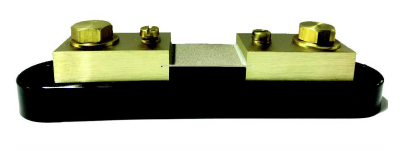Precision Shunt Resistors
Shunts should be mounted with manganin resistive blades in a vertical position in order to promote the free convectional Ow of air. If vertical mounting is not practical, forced air cooling or adding heat sinks to the blocks can reduce the operating temperature. The manganin blades must never exceed +145°C, otherwise permanent resistance chThe TCR resistors converts the current to a voltage that is representative of the physical characteristic and feeds that voltage into control circuits, instrumentation, or other indicators.

When the current of 100A or greater is passing through the shunt, the major portion of heat generated is dissipated by conduction through the shunt terminal blocks into the connecting buss bar or cable. Therefore it is necessary to insure that good contact is made between the shunt terminal blocks and the conductor terminals and that the conductors have adequate cross-section to keep the temperature of the shunt from exceeding 145°C ( 125°C recommended ).
If the shunt is mounted in an enclosure, care must be taken to ensure adequate cooling. If the power density is greater than 1/4 watt per square inch of the enclosure surface for all enclosed devices, additional cooling must be supplied in the form of air vents or fans.
Shunts also must be installed in a way that protects them from thermal expansion forces produced from buss bar or short-circuit forces. Flexible wiring may be required in high pulse current, high vibration, or high-temperature applications.
Where possible, all shunts should be mounted on the ground side of the circuit. For circuits above 750VDC, RS shunts must be mounted on the ground side due to the dielectric strength of the shunt base.
Applications :
Solar Generators, Wind Power, Heavy Industry, Welding, Electroplating, Battery Chargers, etc.
Features :
• High Precision: ± 0.25%, 0.1%, 1%, 5%
• Current Range: 1A to 1200A





